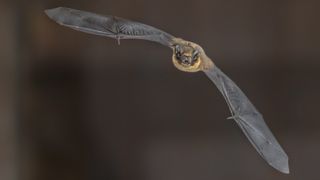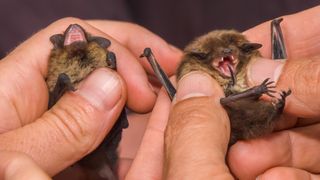Thumb-size bat makes record-breaking flight, gets killed by a house cat
The unfortunate bat had traveled more than 1,200 miles from the U.K. to Russia.

A thumb-size bat that was killed by a house cat in Russia flew a record-breaking 1,254 miles (2,018 kilometers) from the U.K. before meeting its untimely end.
The female Nathusius' pipistrelle (Pipistrellus nathusii), which weighed just under 0.3 ounces (8 grams), was found injured in the village of Molgino in western Russia. It was taken to a local bat sanctuary but later died from its injuries, which were most likely inflicted by a cat, according to a statement by the Bat Conservation Trust in the U.K. (BCT).
The ring on the bat's arm, which belonged to London Zoo, showed that it had previously been caught near Heathrow Airport in London by a volunteer bat recorder in 2016, according to the statement. Since then it has flown farther than any other bat from the U.K.
Related: The world's 6 smallest mammals

"This is a remarkable journey and the longest one we know of any bat from Britain across Europe," Lisa Worledge, head of conservation services at BCT, said in the statement.
The migration is also the second-longest ever recorded for a bat. The record-holder is another Nathusius' pipistrelle that journeyed 1,381 miles (2,223 km) from Latvia to Spain in 2019, according to The Guardian.
"The movements of Nathusius' pipistrelles around the UK and between the UK and the continent remain largely mysterious," Worledge said in the statement. "This journey is an exciting scientific finding and another piece in the puzzle of bat migration."
Sign up for the Live Science daily newsletter now
Get the world’s most fascinating discoveries delivered straight to your inbox.
Nathusius' pipistrelle reports are rare in the U.K., mainly due to historically poor recording by conservation groups. However, the National Nathusius' Pipistrelle Project, which was started in 2014 by BCT, has now recorded more than 2,600 Nathusius' pipistrelle bats in the U.K., including the individual recently killed in Russia.
Conservationists with the pipistrelle project hope they can continue to shed light on these bats' population levels, migration routes and breeding success, as the species is suspected to be vulnerable to climate change, as well as onshore and offshore wind turbines, according to BCT.
Originally published on Live Science.

Harry is a U.K.-based senior staff writer at Live Science. He studied marine biology at the University of Exeter before training to become a journalist. He covers a wide range of topics including space exploration, planetary science, space weather, climate change, animal behavior, evolution and paleontology. His feature on the upcoming solar maximum was shortlisted in the "top scoop" category at the National Council for the Training of Journalists (NCTJ) Awards for Excellence in 2023.
